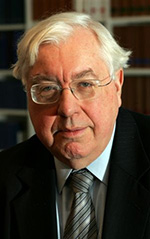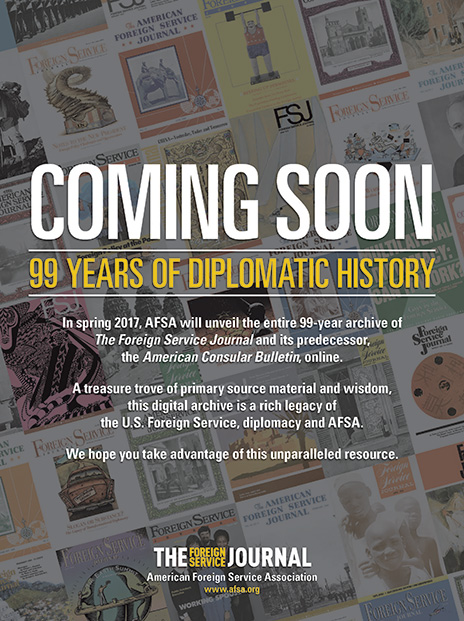The United States and Europe: Toward a Global Atlantic
Globalization and digitalization present as fundamental a challenge to the U.S.-European alliance as the task of rebuilding after World War II.
BY JOHN CHRISTIAN KORNBLUM
During my first weeks in the Foreign Service in 1964, I told the chairman of my A-100 course that I wanted to specialize in European affairs. His reaction was to suggest that my plan was at best misguided and at worst suicidal. Europe was no longer a problem, he told me. No careers were to be made in Europe. The European Economic Community and the Berlin Wall had defined Europe into two parts, and the Western part would soon be able to stand on its own.
Over the dramatic years which followed, I thought back to this conversation from time to time, because it revealed one of the basic dilemmas of American diplomacy. Even at the peak of the Cold War, senior State Department officers preferred hands-on jobs in the Third World to the geopolitics of Europe and Russia.
Assuming that our vision of American particularism was all the strategy we needed, American leaders have from the earliest days of our republic, chosen short-term, “transactional” diplomacy over longer-term strategies. President Donald J. Trump’s preference for dramatic deals rather than careful tending of a strong Atlantic community is only somewhat more pronounced than that of his two immediate predecessors. The great American commentator Walter Lippman noted that this predilection often led to the “insolvency” of American foreign policy.
Needless to say, my career did not suffer from toiling for many years in the European vineyard. There were great moments and more than enough tragedy. Along the way I also came to understand how central the task of rebuilding Europe had been to the success of the great Pax Americana that stabilized the postwar world.
Navigating the Difficult Postwar Years
Most of the goals and methods of America’s new global role were hammered out in Europe during the difficult years after 1945. The same holds true for the global reach of American multinational corporations: as of 2015, American investment in Europe was two and one-half times larger than it was in China. As Richard Holbrooke stated in his groundbreaking article in the spring 1995 edition of Foreign Affairs, circumstances had conspired to make America a European power.
The “normality” of this status, of which my bosses were so certain in 1964, was not, however, a natural occurrence. To achieve it, we had struggled with a Europe beset by historic conflicts, unstable in its existence and unsure about its future. The “normality” of Europe was to be deeply divided and strategically paralyzed. This remains the case today. Had America not been on the scene, it is not hard to imagine what would have happened.
In addition, the Cold War gave an essentially isolationist America a reason to be engaged in the world. Distrust of Europe was replaced by a sense of joint commitment to maintaining the peace. Loss of that sense of common purpose after the Cold War is one of the reasons there is so much debate on both sides of the Atlantic about the future of the Western world.
Most of the goals and methods of America’s new global role were hammered out in Europe during the difficult years after 1945.
But the news is not all bad. Since 1990, America’s digital leadership has resulted in a virtual integration of our economic systems. Whatever Pres. Trump and his advisers may believe, it would be difficult if not impossible to unravel the complex ties that have been built. And the effort to keep the partnership running is minor compared to the costs of its collapse.
But if this is so, why is there again a wave of isolationist sentiment in the United States? A sentiment so strong that it helped propel Donald Trump into power? Why, in the flush of victory in the Cold War, did the Bush administration turn its back on “old Europe” in favor of “coalitions of the willing”? And why did Barack Obama run so fast from leadership in Europe that, after 2014, he essentially turned relations with Russia over to Germany to manage?
Behind the Isolationist Impulse
There are two answers to that question. The first is change—dramatic, rapid and fundamental change. As the late Alvin Toffler suggested in his 1970 classic, Future Shock, too much change overloads us psychologically, affects our decision-making and weakens our ability to act rationally. The relentless pace of globalization has led to a sort of collective post-traumatic shock disorder among Western leaders and publics. It will not end soon.
The second answer goes back to the beginnings of America’s relationship with the rest of the world. From the earliest days of their existence, the new United States felt pushed and threatened by their cousins in Europe—often rightly so. Europeans were ready to pounce on the weak new republic. George Washington warned against foreign entanglements in his famous farewell speech in 1796, and his words have been repeated regularly ever since.
Even after the horrors of the two world wars, President Franklin D. Roosevelt shocked Winston Churchill in 1945 by telling him the United States would take care of Japan, but Europe was Britain’s to put back together. Luckily the Russians changed our minds.
America’s skepticism about global engagement has always been more than a policy; it is an expression of a national point of view about ourselves and our place in the world, a view that contrasts the simple virtues of our republic with the subtle and complex qualities (some say corruptions) of foreigners. We always feel somehow cheated by others, even by our closest friends. One need only follow the Trump Islamic scare to understand the point.
Once challenges such as the Cold War were overcome, packing up and going home became the essence of our long-term strategy. In 1992, Francis Fukayama even proclaimed the end of history, suggesting that Pax Americana was now an automatic thing.
The “normality” of Europe was to be deeply divided and strategically paralyzed. This remains the case today.
By 2011, Europe’s loss of strategic importance was certified by none other than the president of the Council on Foreign Relations, Richard Haass. In “Why Europe No Longer Matters,” published in June 2011 by The Washington Post, Haass suggested that Europe had become irrelevant to American interests. He concluded: “If NATO didn’t exist today, would anyone feel compelled to create it? The honest, if awkward, answer is no.”
Haass may have, in fact, accurately predicted the way many Americans would answer his question. But his answer, nonetheless, was the wrong one. The postwar settlement, which included NATO, was predicated on the lessons of two World Wars and a lost peace during the 1930s. NATO provides the United States with an important multiplier for defense and strategic influence. But don’t be too hard on poor Richard—he at least waited until the Cold War was over to make the pronouncement. I remember well a high-level meeting in the Secretary of State’s conference room in 1975, where not one of the very senior participants could tell us why the United States still had troops in divided Berlin.
U.S.-European Security Is Indivisible
Yet the reason is rather obvious. Better to unify and remain vigilant than to be forced to come in to clean up after a crisis has broken out. And better to remain closely integrated with the rest of the world’s great democracies than to believe that deals with authoritarian states can better serve American interests.
I participated in one such clean-up in the Balkans in the 1990s. During a visit to Belgrade in June 1990, Secretary of State James Baker replied to a question about possible war in the Balkans with a classic piece of Texas wisdom. “We ain’t got no dog in this fight,” the Secretary said. Serbian President Milosevic later told me that those words had electrified him. “That was my go-ahead to start a war.” One could argue that President Obama’s silence on Syria had the same disastrous effect.
In other words, we and Europe cannot escape each other. Bosnia and Syria and the fight against terrorism have demonstrated that American and European security is indivisible. The United States cannot pivot away from Europe any more than a tree can pivot away from the soil in which it is rooted. We are constituent parts of one another in ways that we are not with any other part of the world.
Writing in 1943, during the depth of World War II, Walter Lippmann suggested in American Foreign Policy, Shield of the Republic that an Atlantic alliance would be the best foundation for postwar governance: “The original geographic and historic connections across the Atlantic have persisted. The Atlantic Ocean is not the frontier between Europe and the Americas. It is the inland sea of a community of nations allied with one another by geography, history and vital necessity. . . . There is a great community on this earth from which no member can be excluded and none can resign. This community has it geographical center in the great basin of the Atlantic.”
In a sense, Lipmann was only elaborating on something Alexis de Tocqueville had written more than a century earlier in Democracy in America. There de Tocqueville argued that Europe and America “can never be independent of each other, so numerous are the natural ties which exist between their wants, their ideas, their habits and their manners.”
Unless “Transatlantica” finds a new sense of common purpose to manage the challenges of globalization, we may not be able to ensure that Western values of openness, freedom and tolerance will continue to define the operating system of the digitalized world.
A Pointer to the Future
So what does this all mean for the future? It means that Europe and North America have already joined into one community, dubbed “Transatlantica” by German management guru Hermann Simon. We may often disagree, but we will never break up. Only this time, the task will not be rebuilding Atlantic security, but rather to define a new sort of “global Atlantic” that can help ensure that Western principles guide the new era of digitalization—a task as fundamental to our future prosperity as was the recovery following World War II.
During the past 20 years the world has slipped rapidly, almost without notice, into a new digital and globalized era. The world of formal structures, the world of hierarchical methods of management, the world of nonporous national borders has disappeared, without most of us even knowing what was happening. The existing treaty-based world order is being turned on end faster than any dictator could have done in the past.
The U.S. National Intelligence Council’s 2004 Global Trends Report, “Mapping the Global Future,” described globalization—a growing interconnectedness reflected in the expanded flows of information, technology, capital, goods, services and people throughout the world—as “an overarching ‘mega-trend,’ a force so ubiquitous that it will substantially shape all the other major trends in the world of 2020.”
Western values now dominate the software of this system, but those values also unnerve leaders in countries such as Russia and China. Freedom of information and civil society challenge the influence of authoritarian regimes as no military alliance could ever do. They are already fighting back, as we learned during our recent election campaign.
So unless “Transatlantica” finds a new sense of common purpose as a “global Atlantic” to manage the challenges of globalization, we may not be able to ensure that Western values of openness, freedom and tolerance will continue to define the operating system of the digitalized world.
The unprecedented challenges brought about by globalization and digitalization make almost irrelevant our demands that Europe pay a bigger share for the defense of the West, or that new bilateral trade agreements replace multilateral efforts such as TTIP. Digitalization is extending the battlefield to a new globally integrated domain where national interests and projection of power will be defined more by dynamics within networks than by the behavior of individual actors.
Mastering these challenges will be as complex and important to the survival of democracy as was winning the Cold War. Europe cannot manage this new industrial revolution without America, and America should not want to manage it without Europe.
Read More...
- “How Germany’s Merkel can Lead the West,” The National Interest, March 2017
- “Contribution to a Vision of Europe in the World,” EU Observer, March 2017
- “Preventing a Credibility Crisis in America’s Most Important Alliance,” War on the Rocks, March 2017
- “Europe’s Reverse Domino Effect,” Foreign Affairs, March 2017
- From the FSJ Archives, “The Atlantic Alliance: New Direction Under Reagan?”









